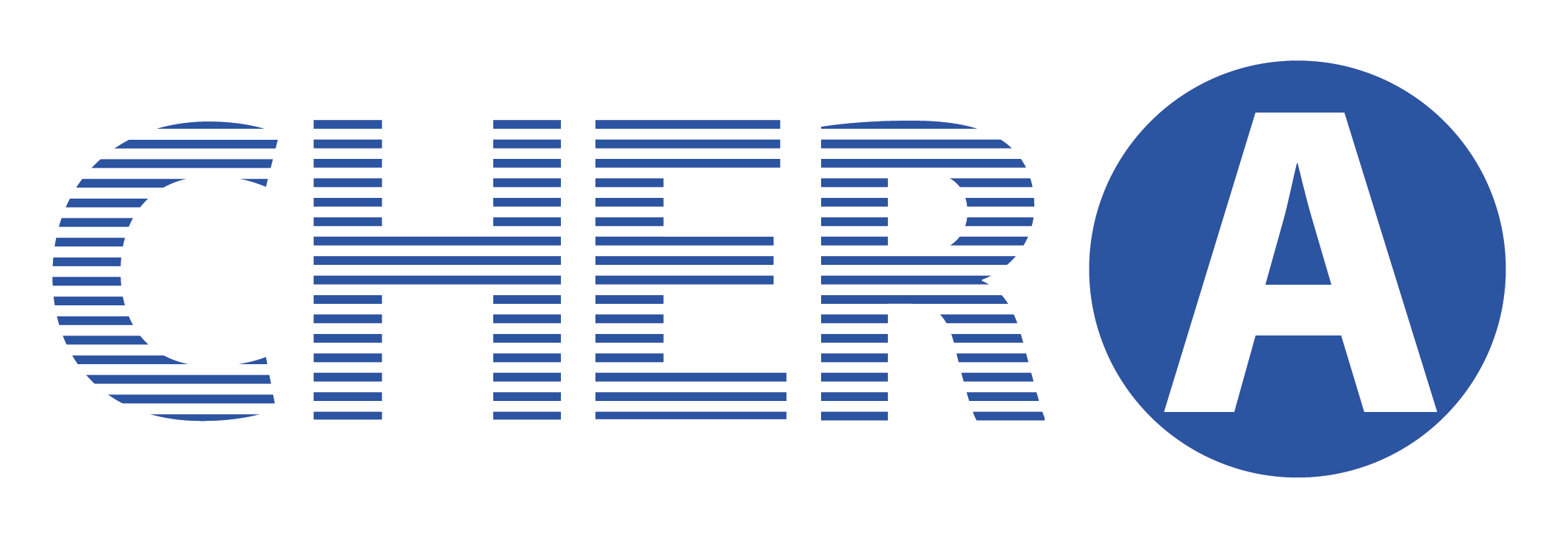
Upcoming seminar
Intercultural research capability in the age of gen AI: Preparing PhD graduates for transcultural knowledge co-construction
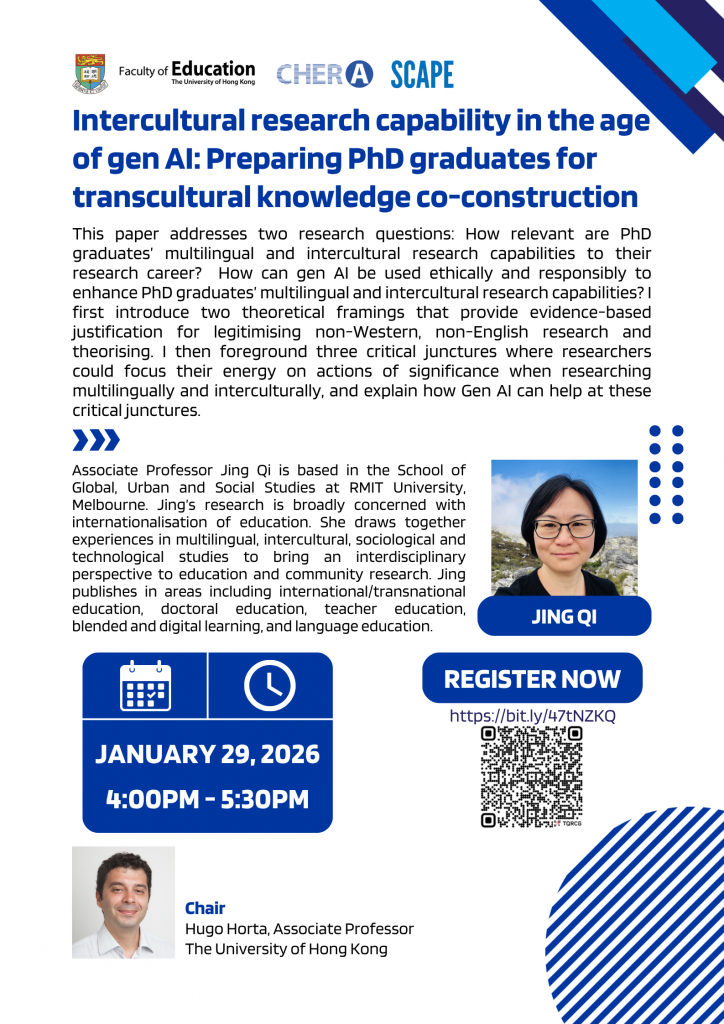
Date: 29th January, 2026
Time: 4:00pm until 5:30pm
Mode: Online by Zoom
Speaker: Prof. Jing Qi, School of Global, Urban and Social Studies, RMIT University, Melbourne
Chair: Prof. Hugo Horta, Faculty of Education, The University of Hong Kong, Hong Kong
Registration link: https://hku.zoom.us/meeting/register/uZLAyzFLRCOcf6DrUNxd2g
Abstract:
This paper addresses two research questions: How relevant are PhD graduates’ multilingual and intercultural research capabilities to their research career? How can gen AI be used ethically and responsibly to enhance PhD graduates’ multilingual and intercultural research capabilities? I first introduce two theoretical framings that provide evidence-based justification for legitimising non-Western, non-English research and theorising. I then foreground three critical junctures where researchers could focus their energy on actions of significance when researching multilingually and interculturally, and explain how Gen AI can help at these critical junctures.
About the speaker:
Associate Professor Jing Qi is based in the School of Global, Urban and Social Studies at RMIT University, Melbourne. Jing’s research is broadly concerned with internationalisation of education. She draws together experiences in multilingual, intercultural, sociological and technological studies to bring an interdisciplinary perspective to education and community research. Jing publishes in areas including international/transnational education, doctoral education, teacher education, blended and digital learning, and language education.
Higher Education and the Chinese Solar-Panel Industry: A Quintuple Helix Perspective

Higher Education and the Chinese Solar-Panel Industry: A Quintuple Helix Perspective
Date: 3rd February (Tuesday), 2026
Time: 17:00 to 18:15
Venue: RMS206, Runme Shaw Building, HKU & Zoom
Speaker: Ha Wei, Associate Professor, Peking University
Chair: Postiglione Gerard, Professor, The University of Hong Kong
Registration link: https://hkuems1.hku.hk/hkuems/ec_regform.aspx?guest=Y&UEID=104744
Abstract:
Higher education resources facilitate the formation and development of regional industrial clusters in the Chinese solar-panel industry. Using a quintuple-helix perspective, this study constructs a collaborative innovation model involving Government, Corporate, University, Startups and Finance with Chinese characteristics. Four evolutionary pathways are identified: institutional supply-driven, knowledge-to-commercialization, market selection-driven, and industrial transformation-led. Case studies of photovoltaic clusters in five Chinese cities reveal significant path diversity and regional heterogeneity, with distinct stage-specific characteristics. The findings demonstrate that indigenous innovation fundamentally supports system operation, while collaborative interaction and functional complementarity among actors are essential for enhancing regional innovation capabilities.
Key words: Triple Helix; Quintuple-Helix; Regional Innovation System; Collaborative Innovation; Photovoltaic Industry
About the speaker:
Professor Ha Wei is the Associate Dean and Associate Professor of Education Policy and Management at the Graduate School of Education, Peking University. He is the also Co-Editor-in-Chief of the International Journal of Educational Development. He specializes in the effects of higher education on regional innovation ecosystems. He received his BA and MA from Peking University and his Ph.D. from Harvard Kennedy School. Prior to joining PKU, he served as policy specialist and senior policy specialist with UNDP and UNICEF in the US and in Africa for almost seven years.
Institutional change in EU-China science cooperation (1998-2025): from expansion to recalibration?

Upcoming seminar: Institutional change in EU-China science cooperation (1998-2025): from expansion to recalibration?
Date: 9th February (Monday), 2026
Time: 3:00pm to 4:15pm
Venue: RMS402, Runme Shaw Building, HKU & Zoom
Speaker: Marcelo Marques, Postdoctoral Fellow, The University of Luxembourg
Chair: Hugo Horta, Associate Professor, The University of Hong Kong
Registration link: https://hku.au1.qualtrics.com/jfe/form/SV_5z2r1EWh7yl83iu
Abstract:
This seminar offers a historical account of how EU–China science cooperation has evolved from the late 1990s to the present. I suggest that institutional change has unfolded cumulatively across four phases: (1) formation and early consolidation (1998–2004); (2) expansion (2004–2014); (3) re-articulation (2014–2019); and (4) recalibration (2019–2025). By mapping cooperation arrangements across the four periods, the seminar shows how cooperation has continued while the arrangements shaping participation have gradually diversified. It concludes by reflecting on what this trajectory suggests about the longer-term institutional evolution of international science cooperation.
About the speaker:
Marcelo Marques is a postdoctoral fellow at the University of Luxembourg, specializing in comparative institutional and organizational analysis. His research explores transnational governance and regionalization processes in the fields of higher education and science, as well as their intersections with other policy domains. He currently serves as Senior Associate Editor of Comparative Education Review.
When Dreams Collapse: How Disadvantaged Chinese College Students Navigate a Broken Mobility Promise

Date: 5th March (Thursday), 2026
Time: 4:00 to 5:15
Mode: online by Zoom
Speaker: Li Zhu, Assistant Professor, Xi’an Jiaotong-Liverpool University
Chair: Hugo Horta, Associate Professor, The University of Hong Kong
Registration link: https://hku.zoom.us/meeting/register/hN3Kqb8yQbC8N8qT47_ycw
Abstract:
In China, higher education has long been framed as a reliable pathway to upward mobility. Yet for many students, entering university exposes structural barriers that fracture this meritocratic promise. This study examines two questions: (1) What consequences do disadvantaged students face when higher-education-based mobility chances become elusive? and (2) How do they cope with this disillusionment? The findings show that students experience intense emotional distress and cognitive dissonance, and that they employ both emotional and cognitive coping strategies. Emotionally, they turn to therapeutic discourses that promote gratitude, contentment, and non-materialistic concepts of success. Cognitively, they reinterpret meritocracy through a neo-familistic lens that emphasizes cross-generational accumulation of effort. These adaptations illuminate the evolving moral tensions of higher education in an era of rising social inequality.
About the speaker:
Dr. Li Zhu is an Assistant Professor in the Department of Educational Studies at Xi’an Jiaotong–Liverpool University. She holds a PhD in Education from the University of California, Berkeley. Her research draws on sociological perspectives to examine the intersections of higher education, social mobility, and meritocratic beliefs. Her current projects explore international doctoral students’ career choices. Her work has been published in the British Journal of Sociology and the British Journal of Sociology of Education. She also serves on the Editorial Boards of the British Journal of Sociology of Education and the Cambridge Journal of Education.
Institutional Resource Inequality and Research Agenda Setting: Early-Career Academics Navigating Research Grant Competition

Date: 30th March (Monday), 2026
Time: 4:00 to 5:15
Mode: online by Zoom
Speaker: Yingxin Liu (Margaret), Assistant Professor (teaching), The Chinese University of Hong Kong (Shenzhen); Huan Li, Assistant Professor, Xi’an Jiaotong-Liverpool University; Hanyu Qin, PhD student, The University of Hong Kong
Chair: Hugo Horta, Associate Professor, The University of Hong Kong
Registration link: https://hku.zoom.us/meeting/register/MTOUsvVjSS2WibMUhVbuDQ
Abstract:
Within the highly competitive research funding ecosystem, early career academics (ECAs) in mainland China face unavoidable pressures to participate in grant competitions as a prerequisite for academic career entry and progression. Focusing on resource inequality within divergent universities, this study investigates the tactical approaches Chinese ECAs employ to navigate their research agendas tailored to funding demands, alongside comparative insights into how research agenda-setting diverges between elite-forging and non-elite-focused universities. Drawing on resource-based view and mobilization strategies (optimization/bricolage), this narrative inquiry interviewed 30 ECAs across 24 elite-forging and non-elite-focused mainland Chinese research institutions. Findings reveal that grant acquisition is contingent on both institutional and individual resource capacities. To navigate this grant competition, ECAs adopt a hierarchical framework of four strategies aligning with incremental resource availability, ordered as follows: necessity-based bricolage, lean-condition optimization, ideational bricolage, and asset-rich optimization. Institutional disparities underpin this pattern: ECAs at non-elite-focused universities predominantly rely on the first two resource-constrained approaches, whereas their elite-forging university counterparts normally leverage the latter two resource-abundant strategies. These insights offer actionable frameworks for ECAs to thrive amid funding competition, while also calling attention to structural inequities in funding systems that universities and policymakers must address to better support ECAs.
About the speaker:
Dr. Yingxin Liu (Margaret) is an assistant professor (teaching) in the School of Humanities and Social Science at The Chinese University of Hong Kong (Shenzhen), Shenzhen, China. Her research interests encompass higher education internationalization, international mobility, talent management, doctoral employment and employability, research agenda-setting, and gender disparities in academia.
Miss Hanyu Qin is a PhD student in the Faculty of Education at The University of Hong Kong. Specializing in higher education, her research interests include doctoral education and the development of early career academics. She is dedicated to understanding the challenges and opportunities facing the next generation of scholars in the academic workforce.
Dr. Huan Li earned his PhD from the University of Hong Kong and currently serves as an Assistant Professor at the Academy of Future Education, Xi’an Jiaotong-Liverpool University. His primary research focus—traced back to his doctoral studies—has centered on doctoral education, specifically the career development of doctoral graduates, encompassing both academic and non-academic career pathways.
香港大學世紀之問 —— 改革開放初期與內地交流的人和事
HKU in the Early Days of Reform and Opening-up

| 《香港大學世紀之問 —— 改革開放初期與內地交流的人和事》 HKU in the Early Days of Reform and Opening-up |
| 主編:陳婉瑩 Editor-in-chief: Ying Chan 出版:三聯書店(香港)有限公司 Publisher: Joint Publishing (H.K.) Co., Ltd. |
| This book tells the story of 18 individuals who pioneered academic and professional exchanges between HKU and mainland China in the 1980’s. These men and women blazed the trail in eight sectors, medicine, engineering, literature and history, education, architecture, social work, law, and city planning, with expertise and dedication. Our CHERA members, Professors Gerard A. Postiglione and Cheng Kai Ming, actively engaged in exchange and communication with the mainland during the Reform and Opening-up period. They are prominently featured in the book with documents, stories, analysis, and photos. |
Jamil Salmi (ed.) (2023). Transforming Lives at the Institutional Level: Equity Promotion Initiatives Across the World
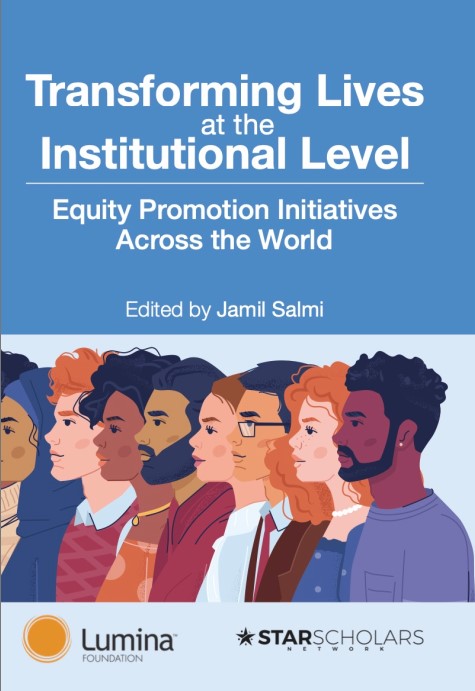
In the ever-evolving landscape of global education, the quest for equitable access to quality higher education remains a pressing challenge. Across the world, countless children and young individuals confront daunting circumstances that impede their educational opportunities due to factors such as race, gender, socioeconomic background, and geographical origin. This particularly affects those in developing countries and marginalized groups globally. To address this issue, promoting inclusivity and pluralism within higher education institutions has become an imperative driven by the principles of social justice and the United Nations’ Sustainable Development Goals.
Throughout Transforming Lives at the Institutional Level: Equity Promotion Initiatives Across the World, readers will gain profound insights into various equity-focused initiatives. From integrating low-income students into university cultures and implementing student aid programs to promoting balanced regional selection and supporting students with disabilities, the case studies offer a wealth of knowledge and good practices. They delve into affirmative action, indigenous inclusion, coaching programs, and many more initiatives aimed at improving access for underrepresented groups. This volume underscores the importance of comprehensive equity promotion policies that encompass financial and nonmonetary aspects. It emphasizes the need for coordination between national and institutional actions, with an equal focus on both access and completion. Long-term perspectives and well-established information systems are essential in effectively addressing equity gaps and measuring progress.
Editor
Jamil Salmi, Global Tertiary Education Expert, Emeritus Professor of Higher Education Policy at Diego Portales University, Chile
Gerard A. Postiglione, Christopher J. Johnstone, & Wesley R. Teter (eds.) (2023). HANDBOOK OF EDUCATION POLICY A New Direction for EU Foreign Policy?
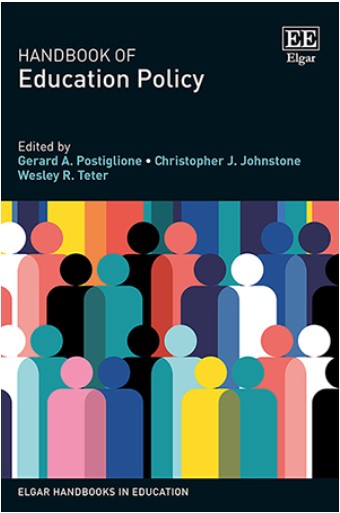
Edited by Gerard A. Postiglione (Professor Emeritus, Honorary Professor, The University of Hong Kong), Christopher J. Johnstone (Associate Professor, University of Minnesota, US) and Wesley R. Teter (Research Fellow, Center for Advanced School Education and Evidence Based Research, University of Tokyo, Japan)
Publisher: Edward Elgar Publishing
‘The new Handbook of Education Policy edited by Postiglione, Johnstone and Teter is a welcome addition to the academic literature on the transformation of education policy in the aftermath of the COVID-19 pandemic. The 22 chapters of this well-researched book give a comprehensive analysis of how education policy must adapt to a radically changed world. Through a skilful combination of thematic pieces and case studies from a large range of countries, the chapter authors challenge us to embrace new education policy concepts, such as public value governance and knowledge democratization, that can foster innovation and accountability in times of uncertainty. Gerard Postiglione, Christopher Johnstone, and Wesley Teter should be congratulated for this excellent scholarly contribution that has the potential of influencing policy makers all over the world to design and implement more sustainable and innovative education policies.’
– Jamil Salmi, Diego Portales University, Chile
‘This Handbook combines an up-to-date overview with theoretically-informed analysis of global education policies. It is erudite, insightful and original. It will be a vital resource for education policy researchers and an excellent starting point for students, in any location.’
– Stephen Ball, University College London, UK
This insightful Handbook is an essential guide to educational policy around the world. As shifting geopolitics, intensified climate change, and widening economic inequalities persist, the need for informed educational policy is critical.
Bringing together a unique collection of international case studies by scholars and practitioners from over twenty countries, the Handbook highlights how the contextual nature of educational policy and its implementation acknowledges both global trends and local nuance. Chapters explore key contemporary topics including the effects of the COVID-19 pandemic on international educational policy; opportunities for academic modernization in Ukrainian society; gender equality in Korean and Japanese universities; and inclusive education policies throughout the developing world, including India, South Africa, and Uruguay. It further discusses the ways in which governmental, non-governmental, and global education specialists are shaping new agendas focused on equity and responding to global crises.
Offering new perspectives on educational policy in a post-pandemic world, this comprehensive Handbook will be crucial reading for students and scholars of education policy, politics and public policy, sociology, and university management. It will also be beneficial for educational research associations and international development agencies, including UNESCO, the Asian Development Bank, and the World Bank.
Click here to access further details about the book.
Book review: Below is the book review for the “Handbook of Education Policy.” You can click on the image to view the full book review or simply click here to explore the book review in more detail.
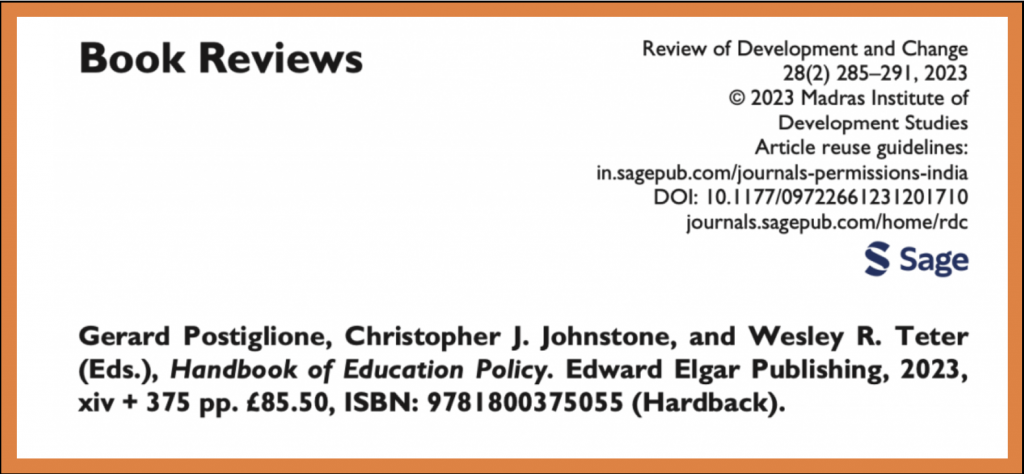
Tilak, J. B. (2023). Book review: Gerard Postiglione, Christopher J. Johnstone, and Wesley R. Teter (Eds.), Handbook of Education Policy
